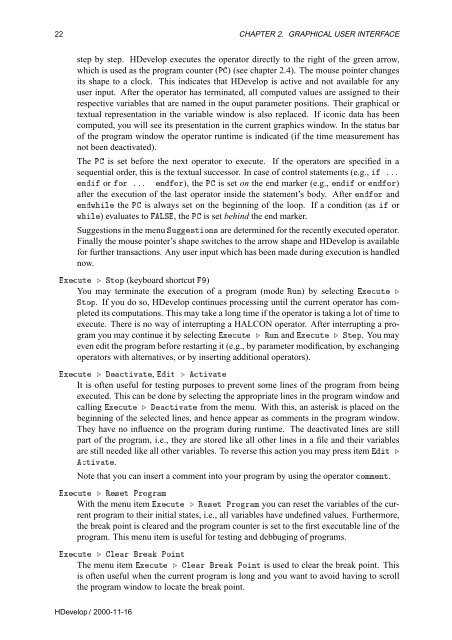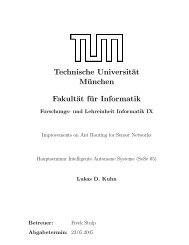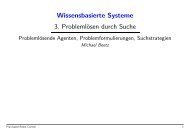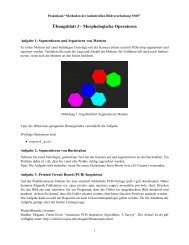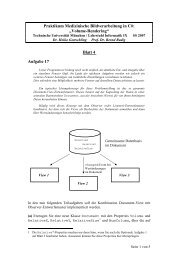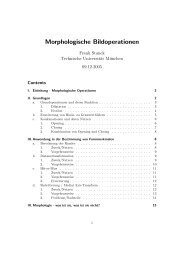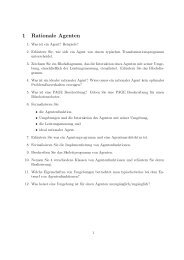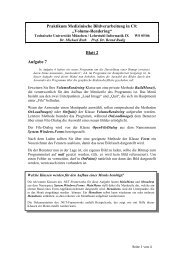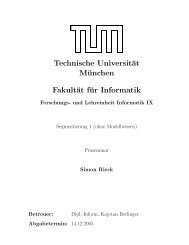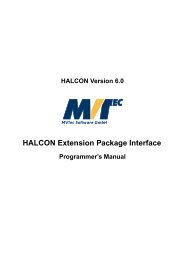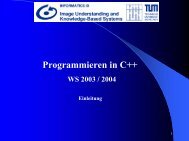You also want an ePaper? Increase the reach of your titles
YUMPU automatically turns print PDFs into web optimized ePapers that Google loves.
22 CHAPTER 2. GRAPHICAL USER INTERFACE<br />
step by step. <strong>HDevelop</strong> executes the operator directly to the right of the green arrow,<br />
which is used as the program counter (È) (see chapter 2.4). The mouse pointer changes<br />
its shape to a clock. This indicates that <strong>HDevelop</strong> is active and not available for any<br />
user input. After the operator has terminated, all computed values are assigned to their<br />
respective variables that are named in the ouput parameter positions. Their graphical or<br />
textual representation in the variable window is also replaced. If iconic data has been<br />
computed, you will see its presentation in the current graphics window. In the status bar<br />
of the program window the operator runtime is indicated (if the time measurement has<br />
not been deactivated).<br />
The È is set before the next operator to execute. If the operators are specified in a<br />
sequential order, this is the textual successor. In case of control statements (e.g., ººº<br />
Ò or ÓÖ ººº ÒÓÖ), the È is set on the end marker (e.g., Ò or ÒÓÖ)<br />
after the execution of the last operator inside the statement’s body. After ÒÓÖ and<br />
ÒÛÐ the È is always set on the beginning of the loop. If a condition (as or<br />
ÛÐ) evaluates to ÄË, theÈ is set behind the end marker.<br />
Suggestions in the menu ËÙ×ØÓÒ× are determined for the recently executed operator.<br />
Finally the mouse pointer’s shape switches to the arrow shape and <strong>HDevelop</strong> is available<br />
for further transactions. Any user input which has been made during execution is handled<br />
now.<br />
ÜÙØ º ËØÓÔ (keyboard shortcut )<br />
You may terminate the execution of a program (mode ÊÙÒ) by selecting ÜÙØ º<br />
ËØÓÔ. If you do so, <strong>HDevelop</strong> continues processing until the current operator has completed<br />
its computations. This may take a long time if the operator is taking a lot of time to<br />
execute. There is no way of interrupting a HALCON operator. After interrupting a program<br />
you may continue it by selecting ÜÙØ º ÊÙÒ and ÜÙØ º ËØÔ. Youmay<br />
even edit the program before restarting it (e.g., by parameter modification, by exchanging<br />
operators with alternatives, or by inserting additional operators).<br />
ÜÙØ º ØÚØ, Ø º ØÚØ<br />
It is often useful for testing purposes to prevent some lines of the program from being<br />
executed. This can be done by selecting the appropriate lines in the program window and<br />
calling ÜÙØ º ØÚØ from the menu. With this, an asterisk is placed on the<br />
beginning of the selected lines, and hence appear as comments in the program window.<br />
They have no influence on the program during runtime. The deactivated lines are still<br />
part of the program, i.e., they are stored like all other lines in a file and their variables<br />
are still needed like all other variables. To reverse this action you may press item Ø º<br />
ØÚØ.<br />
Note that you can insert a comment into your program by using the operator ÓÑÑÒØ.<br />
ÜÙØ º Ê×Ø ÈÖÓÖÑ<br />
With the menu item ÜÙØ º Ê×Ø ÈÖÓÖÑ you can reset the variables of the current<br />
program to their initial states, i.e., all variables have undefined values. Furthermore,<br />
the break point is cleared and the program counter is set to the first executable line of the<br />
program. This menu item is useful for testing and debbuging of programs.<br />
ÜÙØ º ÐÖ Ö ÈÓÒØ<br />
The menu item ÜÙØ º ÐÖ Ö ÈÓÒØ is used to clear the break point. This<br />
is often useful when the current program is long and you want to avoid having to scroll<br />
the program window to locate the break point.<br />
<strong>HDevelop</strong> / 2000-11-16


